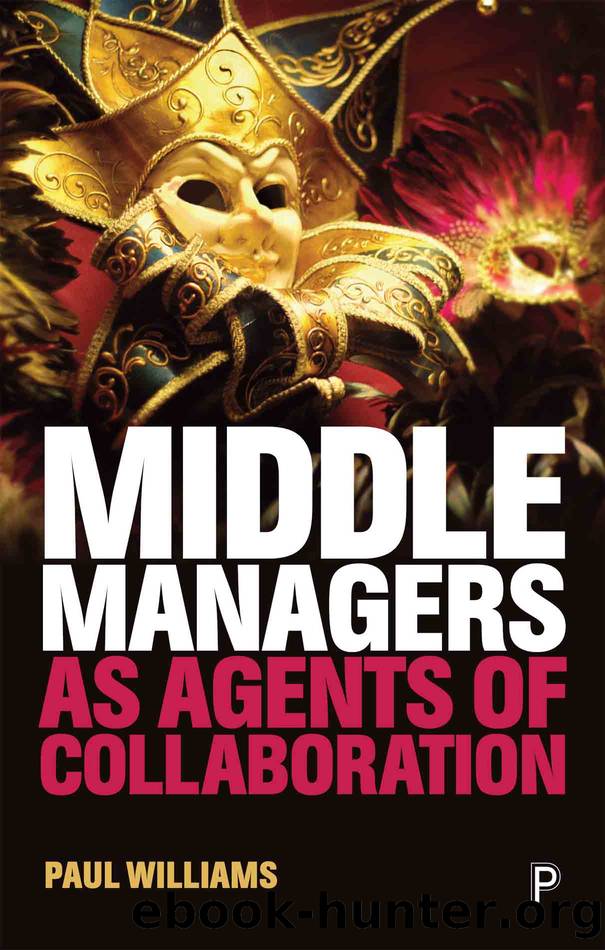Middle Managers as Agents of Collaboration by Paul Williams

Author:Paul Williams
Language: eng
Format: epub
Publisher: Policy Press
Published: 2019-12-15T00:00:00+00:00
These observations reflect a focus on the importance of adhering to, and practising a set of moral standards such as integrity, honesty, openness, being respectful and above all, trustworthiness.
Trust in collaborative relationships
Trust is generally considered to be at the very core of personal relationships, and its importance in collaborative settings cannot be underestimated because of the increased focus of public management on tackling complex public policy problems and issues that cross the boundaries of single organisations, and that require cooperation and collaboration between diverse actors and agencies to resolve them. 6 et al (2006: 117) suggest that:
it is important for managers in organisations to take some pains to develop rich appreciations of the specific contextual and institutional characteristics of the network environment â and the trust relations of this environment â and to make their decisions about the strategies for trust and trustworthiness in the light of this appreciation.
Agranoff (2003: 22) comments that:
Social capital, or the built-up reservoir of good will that flows from different organisations working together for mutual productive gain, no doubt is the âglueâ that holds people together or the âmotivatorâ that moves the process along. But in terms of what helps to steer networks, it is clearly trust, the obligation to be concerned with othersâ interests, that allows for the network to do its work, select its leaders, keep its members, and most important, to broker those decisions it must make.
Milward and Proven (2006: 10) argue that: âthe currency of a network is the trust and reciprocity that exist among its membersâ and âthe more trust and reciprocity in the network, the greater the ability of the network to accomplish shared goalsâ. They proceed to argue that: âThe task of network managers is to increase the stock of trust and reciprocity by creating incentives (using resources) and to increase their collaborative skills to build relationships within the network to accomplish network goals.â Trust involves the suspension of risk leading to cooperation, flexibility, innovation, learning and an increase in cost-effectiveness; whereas distrust encompasses regulation, behavioural control, high transaction costs and low, predicable gains. La Porte (1996: 69) conceptualises trust in public organisation networks from the vantage points of three types of networker and argues that:
net riders seek to arrange relationships with other net members so that they can trust them and work out the efficient monitoring means to be assured that other exchange partners can continue to be trusted within a more or less fixed system of incentives. (In a sense, they seek to reduce the transaction costs of incipient suspicion.) Net throwers examine the political, legal, and economic conditions that foster or diminish the likelihood that net members will become and will stay trustworthy. Attentive outsiders seek insights about the leverage outsiders can play as monitors or enhancers of trustworthiness, or as destroyers of trusted relations.
The notion of trust has attracted a large body of inter-disciplinary literature, and consequently its understanding is fraught with ambiguity, lack of specificity and debate. Oomsels and Bouckaertâs (2014) review of
Download
This site does not store any files on its server. We only index and link to content provided by other sites. Please contact the content providers to delete copyright contents if any and email us, we'll remove relevant links or contents immediately.
The Secret History by Donna Tartt(19094)
The Social Justice Warrior Handbook by Lisa De Pasquale(12191)
Thirteen Reasons Why by Jay Asher(8914)
This Is How You Lose Her by Junot Diaz(6890)
Weapons of Math Destruction by Cathy O'Neil(6282)
Zero to One by Peter Thiel(5804)
Beartown by Fredrik Backman(5759)
The Myth of the Strong Leader by Archie Brown(5510)
The Fire Next Time by James Baldwin(5450)
How Democracies Die by Steven Levitsky & Daniel Ziblatt(5219)
Promise Me, Dad by Joe Biden(5154)
Stone's Rules by Roger Stone(5088)
A Higher Loyalty: Truth, Lies, and Leadership by James Comey(4965)
100 Deadly Skills by Clint Emerson(4927)
Rise and Kill First by Ronen Bergman(4790)
Secrecy World by Jake Bernstein(4754)
The David Icke Guide to the Global Conspiracy (and how to end it) by David Icke(4720)
The Farm by Tom Rob Smith(4514)
The Doomsday Machine by Daniel Ellsberg(4491)
